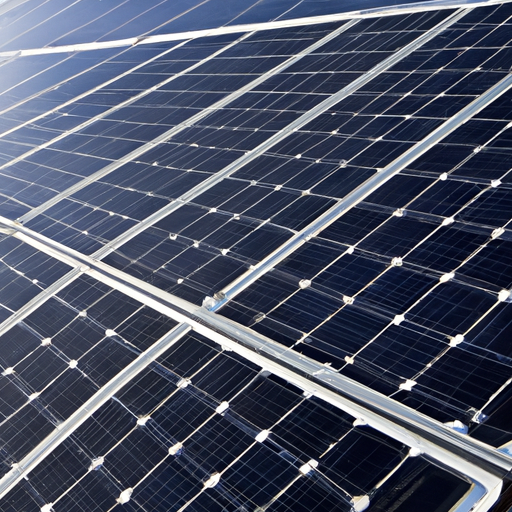

Have you ever considered using a solar generator to power your energy needs? It’s a great eco-friendly option that can save you money in the long run. But before you make the jump, you need to figure out the appropriate size of the generator that will suit your energy needs. Don’t worry, it’s not as complicated as it sounds!
When determining the size of a solar generator, there are a few key factors you need to consider. The first is your average daily energy consumption. Take a look at your recent electricity bills and determine your average daily kilowatt-hour (kWh) usage. This will give you an idea of how much energy you need to generate each day. You should also think about any energy-efficient measures you can implement, such as using LED light bulbs or turning off appliances when not in use, as this will help reduce your overall energy consumption.
Another factor to consider is the amount of sun exposure your location receives. If you live in a place that gets plenty of sunlight throughout the year, you may be able to get away with a smaller generator. On the other hand, if you’re located in an area with limited sunlight, you’ll need a larger generator to compensate for the lower energy production. It’s also worth noting that the size of the solar panels themselves will impact the amount of energy generated. Larger panels will produce more energy, so if you have the space for them, it may be worth investing in larger panels to meet your energy needs.
In conclusion, determining the appropriate size of a solar generator for your energy needs is a matter of understanding your average daily consumption, considering energy-efficient measures, and taking into account the amount of sun exposure in your location. To further explore this topic and get more specific recommendations, be sure to check out the full article. We’ll dive deeper into the calculations and provide you with helpful tips to ensure you choose the right size solar generator for your lifestyle.


Factors to Consider for Determining Solar Generator Size
When it comes to choosing a solar generator, determining the appropriate size is crucial to meet your energy needs effectively. Investing in a solar generator that is too small can lead to energy shortages, while a generator that is too large would be an unnecessary expense. To find the right size for your solar generator, there are several important factors to consider. This article will guide you through the process, step by step, ensuring you make an informed decision.
Energy Consumption
The first factor to consider when determining the size of your solar generator is your energy consumption. To accurately assess your energy consumption, start by identifying all the appliances and devices that you regularly use. This includes everything from lights and fans to bigger appliances like refrigerators, air conditioners, and washing machines.
Once you have identified your appliances and devices, determine their power ratings. This information can usually be found on the devices or in their manuals. Note down the power rating for each appliance, measured in watts.
After gathering all the power ratings, calculate your daily energy consumption by multiplying the power rating of each device by the number of hours you use it. Sum up all the results to get an estimate of your total daily energy consumption.
Assessing Peak Load
In addition to your daily energy consumption, it is essential to assess your peak load. Peak load refers to the maximum amount of power needed at any given moment during the day. This is especially important if you have high-powered appliances that may require a significant amount of energy when they are turned on simultaneously.
Identify the high-powered appliances in your home, such as air conditioners or electric heaters. Determine the power rating of each appliance and consider when they are most likely to be used together. For example, during hot summer days, your air conditioner and refrigerator may be running simultaneously.
Calculate your peak load by adding up the power ratings of all the appliances that are likely to be used at the same time. This will give you an idea of the maximum power requirement your solar generator needs to meet during peak usage.
Evaluating Sunlight Availability
The amount of sunlight available in your geographical location is another important factor to consider when determining the size of your solar generator. The more sunlight you receive, the more energy your solar panels can generate. Assessing sunlight availability helps you estimate how many hours your solar panels can effectively convert sunlight into electricity.
Start by assessing your geographical location. Different regions receive varying amounts of sunlight throughout the year. For example, areas closer to the equator generally have more hours of sunlight compared to regions further away.
Consider seasonal variations as well. Some regions experience significant variations in sunlight hours between seasons. Take note of the average sunlight hours during each season to get a comprehensive understanding.
Calculate your average daily sunlight hours by adding up the sunlight hours for each season and dividing by the number of seasons. This will give you a rough estimate of the daily sunlight hours available for your solar panels to harvest energy from.


Understanding Battery Capacity
Battery capacity is an essential aspect to consider when determining the size of your solar generator. The battery stores excess energy generated by your solar panels during the day, allowing you to use it at night or during periods of low sunlight. Evaluating your battery capacity is crucial to ensure you have sufficient backup power when needed.
First, determine how long you would like your solar generator to provide backup power. This will depend on your usage patterns and the duration of time you might be without sunlight. For instance, if you experience frequent power outages, you may want a solar generator that can provide backup power for multiple days.
Next, evaluate the efficiency of the batteries you are considering. Battery efficiency refers to how well the battery can store and release energy. Higher efficiency batteries will provide more energy for a longer duration.
Calculate the required battery capacity by multiplying your daily energy consumption by the number of backup days you desire. Divide this result by the battery efficiency to get an estimate of the required battery capacity.
Determining Inverter Capacity
The inverter is another important component of your solar generator. It converts the DC (direct current) power generated by your solar panels into AC (alternating current) power that is usable by your appliances and devices. Determining the appropriate inverter capacity ensures that you can power all your electronic devices effectively.
Identify the efficiency rating of the inverters you are considering. Inverter efficiency refers to how effectively the inverter can convert DC power into AC power. Higher efficiency inverters will maximize the energy output and reduce energy loss.
Evaluate the power ratings of the appliances and devices you plan to power with your solar generator. Calculate the total power requirement by summing up the power ratings of all the devices.
Calculate the required inverter capacity by dividing the total power requirement by the inverter efficiency. This will give you an estimate of the inverter capacity needed to meet your electricity demands.
Calculating Total Solar Generator Size
Now that you have evaluated your energy consumption, peak load, sunlight availability, battery capacity, and inverter capacity, it’s time to calculate the total size of your solar generator. Consider all the factors mentioned and follow these steps:
- Start by considering your energy consumption and peak load. Add them together to get an estimate of your maximum daily power requirement.
- Factor in the sunlight availability. Multiply your maximum daily power requirement by the average daily sunlight hours to estimate the energy generation potential of your solar panels.
- Account for the battery capacity. Subtract the power generated by your solar panels from your maximum daily power requirement. This will give you an estimate of the energy your batteries need to store.
- Finally, account for the inverter capacity. Make sure that the inverter capacity is equal to or greater than your total power requirement.
By considering all these factors and calculations, you can determine the appropriate size of a solar generator that will effectively meet your energy needs.
Consulting Solar Energy Experts
While this article provides a comprehensive guide, it is always beneficial to consult solar energy experts when determining the appropriate size of a solar generator. Professional recommendations can help you make an informed decision based on your specific requirements and circumstances.
Solar energy experts can also offer customizable solutions tailored to your energy needs. They can assess your current energy consumption patterns and suggest the best solar generator size and configuration to optimize energy production and usage.
For a more detailed assessment of your solar system requirements, consider getting a professional solar system assessment. This will provide a comprehensive analysis of your energy needs, taking into account factors such as roof orientation, shading, and future energy requirements.
Determining Budget and Affordability
In addition to considering the technical aspects of sizing your solar generator, it is essential to evaluate your budget and affordability. Research the costs associated with solar generators of different sizes, including the solar panels, batteries, and inverters.
While the initial investment in a solar generator may seem significant, it is important to consider the long-term energy savings. Solar generators can significantly reduce your electricity bills over time, making them a cost-effective solution in the long run.
Furthermore, consider financing options such as loans or leasing arrangements that may help make your solar generator more affordable. Many governments and financial institutions offer incentives and subsidies for renewable energy installations, so make sure to explore these opportunities.
Conclusion
Choosing the right size solar generator is essential for meeting your energy needs effectively and maximizing your investment. By properly evaluating factors such as energy consumption, peak load, sunlight availability, battery capacity, and inverter capacity, you can determine the appropriate size for your solar generator.
Consulting solar energy experts can provide valuable guidance and a comprehensive assessment of your energy requirements. They can help customize a solar generator solution that optimizes energy production and usage for your specific needs.
Considering your budget and affordability is also crucial in making a well-informed decision. Research the costs associated with solar generators and evaluate potential energy savings over time. Explore financing options that can make your investment more manageable.
With careful consideration and expert guidance, you can determine the appropriate size of a solar generator that meets your energy needs and provides you with clean, renewable power. So, take the time to assess your requirements, consult professionals, and make a wise investment in solar energy.



